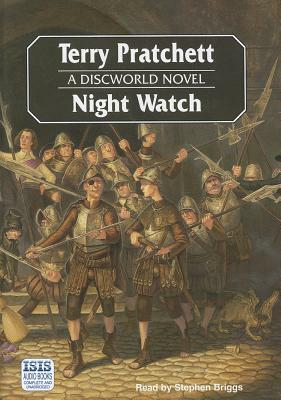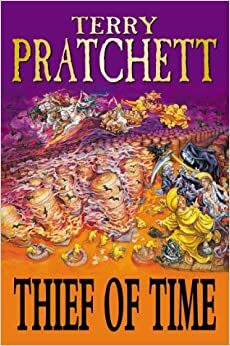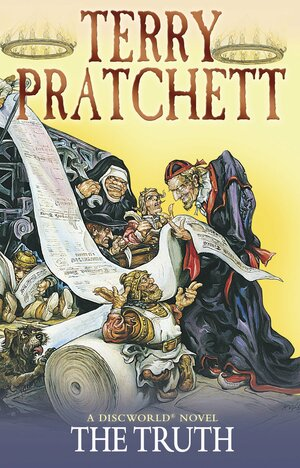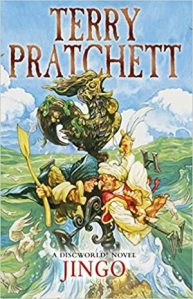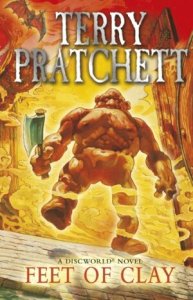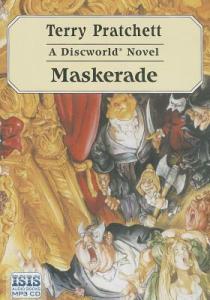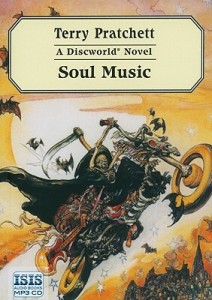Title: Night Watch
Series: Discworld #29 (City Watch #6)
Author: Sir Terry Pratchett
Genre: Fantasy
Trigger Warnings: Death, blood, murder, injury, war, torture, fire, pregnancy (mentions), animal death (mentions), animal cruelty (brief), police brutality
Spoiler Warning: This book is 29th in the series, but reading beyond this point will expose you to only the mildest spoilers of the previous City Watch books.
Back Cover:
Commander Sam Vimes of the Ankh-Morpork City Watch is back in his own rough, tough past. He must track down a murderer, teach his young self how to be a good cop and change the outcome of a bloody rebellion. There’s a problem: if he wins, he’s got no wife, no child, no future.
Review:
I am not generally into books about time travel shenanigans. Not because I have anything against time travel in particular, but it just seems to be rare to have it done well, or at least in a way that I find enjoyable to read about. But, as usual, Sir Terry pulled it off.
I think a lot of that has to do with the character of Commander Samuel Vimes of the Ankh-Morpork City Watch. Due to some unfortunate wrong-place, wrong-time magical happenstance, Vimes ends up in his own past – the Ankh-Morpork of many decades ago, when he had just joined the Watch and things were, objectively, much worse than they are now. But one of the things that I appreciate most about Commander Vimes is that he is a relentlessly practical man. I recognize a kindred spirit in that, but it also means that the situation may be weird and fairly unpleasant, but he gets right on with dealing with it, with very little pining or philosophizing and absolutely no dithering or worrying about paradoxes.
That’s not to say that he’s emotionless, though. In fact, what makes Vimes so stellar as a character to me throughout this whole series is that he is competent, practical, and stays focused on the problem(s) in front of him instead of wasting time with excessive introspection or philosophizing, but he also has a strong set of personal values, cares deeply for the people around him, and feels his emotions intensely. He doesn’t do the introspection on the page because he doesn’t need to; he already knows himself thoroughly and is in control. To use the cliché, he is in touch with his feelings, but though they may tempt him to act against his values, they never control him. In so many ways, he is a paragon of positive masculinity – competent, principled, practical, honorable, caring, willing and able to experience great depth of feeling, never letting his feelings overrule him. He’s the rare character who is great to read about as a character, and also someone I think I would like, or at least respect, in real life.
Apparently this is the Sam Vimes Appreciation Review. That does make sense, because he really is the star of this book. Sure, there’s the whole time travel thing. There’s the murderer he’s tracking who also got zapped into the past and has the same future knowledge that Vimes does. There’s the fact that this point in the past is a particularly sticky one for Ankh-Morpork. There’s the sheer delight of a character being spectacularly good at what they do (some of it because Vimes has future knowledge, but much of it because he’s just a really, really good watchman). All of that is quite enjoyable to read. But this is a book that pushes Commander Vimes to his limits, and that means that he, as a character, is really what carries this story.
The Discworld series doesn’t generally shy away from getting dark in places. But this book is probably the darkest that I’ve read so far, and since the City Watch sub-series tends to be less funny in general, it’s not tempered with humor into something darkly funny. It’s just dark. Not at all in a bad way, to be sure. As I said, these events push Vimes to his limit, and it’s hard to do that without delving into some darkness. But even in terms of sheer numbers of deaths and injuries, this has got to be one of the more violent Discworld books. It’s not unnecessary violence when it comes to the plot, but it definitely goes (and takes Commander Vimes to) some very dark places.
I can’t necessarily say that Night Watch has replaced Interesting Times as my favorite Discworld book. The two are so different in mood, tone, theme, and content that it’s hard to do a direct comparison. But I can definitely say that Night Watch is among my favorite Discword books. If you like Commander Vimes as a character, love stories where protagonists are pushed to their limits, or just enjoy the very specific trope where a character is sent back in time and has to relive a difficult part of their life from a new perspective, I think you’ll agree.
The Discworld Series:
- The Colour of Magic
- The Light Fantastic
- Equal Rites
- Mort
- Sourcery
- Wyrd Sisters
- Pyramids
- Guards! Guards!
- Eric
- Moving Pictures
- Reaper Man
- Witches Abroad
- Small Gods
- Lords and Ladies
- Men at Arms
- Soul Music
- Interesting Times
- Maskerade
- Feet of Clay
- Hogfather
- Jingo
- The Last Continent
- Carpe Jugulum
- The Fifth Elephant
- The Truth
- Thief of Time
- The Last Hero
- The Amazing Maurice and His Educated Rodents
- Night Watch
- The Wee Free Men
- Monstrous Regiment
- A Hat Full of Sky
- Going Postal
- Thud!
- Wintersmith
- Making Money
- Unseen Academicals
- I Shall Wear Midnight
- Snuff
- Raising Steam
- The Shepherd’s Crown

